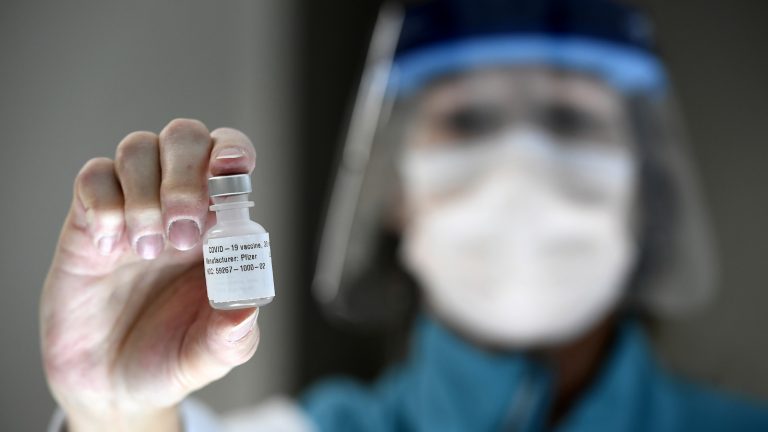The coronavirus is back in full swing, apparently. And now, Americans are bracing for the return of heavy-handed pandemic policies. President Biden recently acknowledged that, unless more Americans are willing to get the vaccine, more federal guidelines and restrictions are on the horizon. Although his administration is taking several steps to ramp up injections, these efforts will likely not be enough. Too many Americans are wary of getting the jab.
Why aren’t more Americans getting vaccinated?
There are various reasons, but one that’s getting tossed out now is the FDA’s hesitance to approve the COVID-19 vaccines—causing suspicion that the treatments don’t work or could be dangerous. But this says more about the FDA’s already-questionable track record than COVID-19 vaccines.
Historically, the FDA’s reticence to approve new drugs prevented US patients from using beta-blockers, antidepressants, and birth control pills for years after becoming available in Europe. Today, the FDA’s antiquated testing methods prevent Americans from using gene-based medications commonly used in other nations.
The FDA also causes the US to trail many nations in approving vaccines. From 2014-2016, the Ebola virus claimed the lives of 11,000 people across western Africa. Scientists across the globe raced to develop a vaccine for the deadly virus by 2015. While many developed nations adopted the vaccine shortly after, the FDA took an additional four years to approve it.
Knowing their normal process of testing and approving a vaccine can typically take many years, the FDA granted emergency use authorizations to three COVID-19 vaccines in late 2020 and early 2021. This authorization allowed the vaccine producers to bypass much of the approval process and get into patients’ arms quickly.
Since then, the FDA has given mixed messages about vaccine safety. First, it paused using the Johnson & Johnson COVID-19 vaccine for several weeks following reports of patients experiencing blood clotting. Then they stopped, and never resumed, reviewing AstraZeneca’s COVID-19 vaccine for similar reasons.
Although their caution was well-intended, these events bolstered many Americans’ decision not to get vaccinated, which has garnered them considerable disdain and criticism.
As these disagreements continue to polarize the country, the FDA’s decision of when and what criteria it will use to approve COVID-19 vaccines becomes even more critical for addressing the Delta variant. Sadly, this decision has been placed in idle hands when time is of the essence.
Fortunately, emergency use authorizations without further FDA involvement have been more than enough to help Americans battle the pandemic.
Consider the incredible diversity and proliferation of COVID-19 testing produced absent FDA approval. From May 2020 to August 2020, the FDA granted emergency use authorization to 140 different COVID-19 testing kits. Just two were recalled.
In 2014, the drug remdesivir entered a clinical trial to help treat the Ebola virus. The results were promising, but the FDA determined it did not meet its standards. It was later used in other clinical trials to combat MERS and SARS outbreaks. However, the FDA again deemed it unfit for approval.
As COVID-19 spread across the US, physicians urged the FDA to grant patients experimental access to remdesivir. With no available treatments, the agency hesitantly allowed for expanded access. Within a few months, the prestigious Journal of the American Association reported patients using the drug survived severe infections more often and were released from hospitals sooner.
On its way to becoming the standard of care for COVID-19 and saving countless lives across the globe, remdesivir received two emergency use authorizations. In October 2020, the FDA fully approved remdesivir to treat COVID-19 even though the drug never underwent the complete approval process. Not even the FDA thought it needed to.
The spread of the Delta variant threatens to plunge the US back into the pandemic. More vaccinations can prevent it. The FDA’s failure to approve them is undermining this effort. But its own failures and the recent successes of emergency use authorizations show there is no need to wait.














The FDA delaying approval of the Covid vaccine is causing hesitancy for people to be vaccinated and thereby making the disease last longer all across the country. Just awful.
First it’s not a vaccine. You can still get covid-19 and the delta variant after getting the shot. You can also spread these viruses after getting the shot. It will not eradicate the covid-19 virus and it’s variants. It will become just like the flu shot where they take a guess which strain will be going around and put out the shot. Next I don’t have a problem with the fda being overly cautious. Finally the only reason we have any choice whether or not to get the shot is because it hasn’t been approved. As soon as it is – and no matter how safe or dangerous it turns s out there is no way they cant approve it now – we will no longer have a choice of whether to get the shot or not. Within days we’ll have vaccine passports, restrictions on travel and commerce all depending on vaccine status.
It’s just about control. You can still get it and give it but now they’ll have a national I’d program to track your every action.
Nah. Blame the fact that this isn’t a serious disease unless you’re already on death’s door.
If you’ve already had it like so many of us, and it was nothing more than a flu, as it is for the majority of people, literally any vaccination risk is too much risk.
ABBOTT AND COSTELLO’S ‘WHO’S BEEN VACCINATED?’
Bud: ‘You can’t come in here!’
Lou: ‘Why not?’
Bud: ‘Well because you’re unvaccinated.’
Lou: ‘But I’m not sick.’
Bud: ‘It doesn’t matter.’
Lou: ‘Well, why does that guy get to go in?’
Bud: ‘Because he’s vaccinated.’
Lou: ‘But he’s sick!’
Bud: ‘It’s alright. Everyone in here is vaccinated.’
Lou: ‘Wait a minute. Are you saying everyone in there is vaccinated?’
Bud: ‘Yes.’
Lou: ‘So then why can’t I go in there if everyone is vaccinated?’
Bud: ‘Because you’ll make them sick.’
Lou: ‘How will I make them sick if I’m NOT sick and they’re vaccinated.’
Bud: ‘Because you’re unvaccinated.’
Lou: ‘But they’re vaccinated.’
Bud: ‘But they can still get sick.’
Lou: ‘So what the heck does the vaccine do?’
Bud: ‘It vaccinates.’
Lou: ‘So vaccinated people can’t spread covid?’
Bud: ‘Oh no. They can spread covid just as easily as an unvaccinated person.’
Lou: ‘I don’t even know what I’m saying anymore. Look. I’m not sick.
Bud: ‘Ok.’
Lou: ‘And the guy you let in IS sick.’
Bud: ‘That’s right.’
Lou: ‘And everybody in there can still get sick even though they’re vaccinated.’
Bud: ‘Certainly.’
Lou: ‘So why can’t I go in again?’
Bud: ‘Because you’re unvaccinated.’
Lou: ‘I’m not asking who’s vaccinated or not!’
Bud: ‘I’m just telling you how it is.’
Lou: ‘Nevermind. I’ll just put on my mask.’
Bud: ‘That’s fine.’
Lou: ‘Now I can go in?’
Bud: ‘Absolutely not?’
Lou: ‘But I have a mask!’
Bud: ‘Doesn’t matter.’
Lou: ‘I was able to come in here yesterday with a mask.’
Bud: ‘I know.’
Lou: So why can’t I come in here today with a mask? ….If you say ‘because I’m unvaccinated’ again, I’ll break your arm.’
Bud: ‘Take it easy buddy.’
Lou: ‘So the mask is no good anymore.’
Bud: ‘No, it’s still good.’
Lou: ‘But I can’t come in?’
Bud: ‘Correct.’
Lou: ‘Why not?’
Bud: ‘Because you’re unvaccinated.’
Lou: ‘But the mask prevents the germs from getting out.’
Bud: ‘Yes, but people can still catch your germs.’
Lou: ‘But they’re all vaccinated.’
Bud: ‘Yes, but they can still get sick.’
Lou: ‘But I’m not sick!!’
Bud: ‘You can still get them sick.’
Lou: ‘So then masks don’t work!’
Bud: ‘Masks work quite well.’
Lou: ‘So how in the heck can I get vaccinated people sick if I’m not sick and masks work?’
Bud: ‘Third base.’
And…scene…
Copied from a friend.
And, of course, the FDA has delayed the protocol for vaccinating kids under 12. We have declared a national medical emergency and as the author opines, decision making is in the hands of some idle bureaucrat…smh.